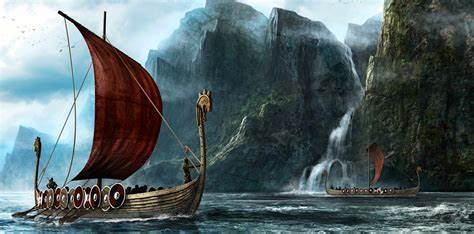

"Viking" is not actually an ethnicity, but an occupation. It basically means "pillaging." The people who went a-viking came from Scandanavia, Norway, and Denmark. Beginning the eighth century, they began raiding England and Francia from the North Sea, and raiding eastern Europe by sailing down the Dnieper and Volga rivers.
Eventually, Viking presence became more permanent in several places throughout Europe. A Viking named Rurik became the leader of the city of Novgorod; the Slavic city of Kiev seems to have been founded by Vikings. In France, the area where the "north-men" settled became known as "Normandy." After several failed attempts to attack Constantinople, the Roman Emperor began asking Vikings to serve as his personal shocktroops, a group that was called the Varangian Guard.
Two major events in the eleventh century precipitated the end of the Viking Era: first, the conversions to Christianity of Norwegian king Harald Bluetooth in 960 and Swedish king Olaf Skötkonung around 995; second, the failed invasion of England by Norwegian/Danish king Harald Hardrada in 1066.
In addition to their history and their role in European history, the Viking religion (usually called "Norse Mythology") has had a wide-ranging cultural impact. The sagas of the Norse gods include Odin (Wotan), the king of the gods; his wife Freya (Fricka), Thor (Donner), the god of thunder; Loki (Loge), the god of mischief; as well as Odin's children the Valkyrie (Walküre), and a host of dwarves, dragons, river-nymphs, spirits, and talking animals.